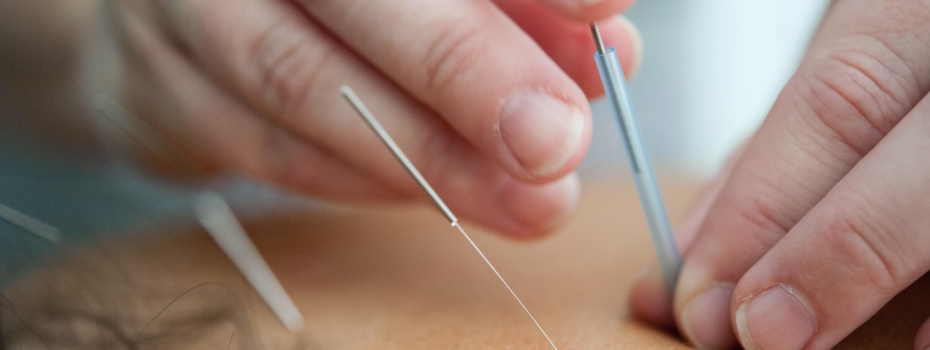Can complementary therapies like acupuncture help conception?

We often get asked whether complementary therapies like Traditional Chinese Medicine (TCM), naturopathy, acupuncture, and homeopathy can help with conception. While there is still quite limited evidence that proves the beneficial impact of complementary and alternative medicines and therapies on fertility, we know that improving your health should be your top priority, and we totally support a holistic approach that combines a science-based approach with complementary therapies.
Acupuncture and fertility
Acupuncture is the therapy that we most frequently get asked about. Acupuncture treatment involves the insertion of fine, sterile, single-use, disposable needles into specific sites (acupuncture points) along the body’s energy pathways (called ‘meridians’) to clear energy blockages and encourage the normal flow of energy, or Qi, through the body. Along with listening to a patient, acupuncturists will ask general questions about your health and palpate, or feel your body to check for pain or inflammation. An appointment usually lasts around one hour, and the needles inserted for 30 minutes. In most fertility cases, the needles are focused around the legs, lower back, or lower abdomen.
The aim of treatment is to improve blood flow to the ovaries and endometrium. This may encourage the ovaries to function, and may also help to increase the thickness of the endometrium - the uterine lining.
Acupuncture for fertility is reported by patients to be helpful in:
- Increasing a sense of well-being, stress reduction and relaxation
- Alleviating side effects from medication and/or egg pick-up including trauma, bleeding, bloating, pain, constipation, and anxiety
- Reducing uterine cramping/pain
But does acupuncture increase the chances of pregnancy?
This is a trickier question to answer. There have been several clinical studies of varying quality conducted on the effectiveness of acupuncture in increasing pregnancy rates. A recent review of 20 trials that included a total of 5,130 women found that when administered within 1 day of embryo transfer, acupuncture increased clinical pregnancy, ongoing pregnancy, and live births when compared with no treatment at all.
However, there was a catch. There was no evidence of a positive effect when acupuncture was compared with ‘sham’ controls. (A sham control is like a placebo, in this case rather than using acupuncture needles, other things were used that simulate acupuncture point location, needle insertion, and stimulation.)
This suggests that it may not be the actual acupuncture treatment that was having a positive effect, but rather something else. This could be the positive mental health aspects from taking control of one’s own health or something else in the overall ‘acupuncture’ experience such as palpation (touch), being listened to, and so on. Whether that matters to you may depend on how much you dislike needles!
Looking at those who did have the ‘real’ acupuncture, it was shown that having three or more treatments in the weeks leading up to embryo transfer may improve pregnancy rates. Treatments after the day of embryo transfer showed no benefit whereas those who had treatments pre-transfer were more likely to become pregnant.
The review also shows that acupuncture appears to have a positive effect on clinical pregnancy rates when used in women who have had multiple previous IVF cycles. However, the research wasn’t controlled for whether women also had other treatments intended to ensure optimal embryos for transfer, such as preimplantation genetic screening (designed to select chromosomally normal embryos) or other treatments to ensure optimal endometrial receptivity (such as the endometrial receptivity array, ERA). Therefore it cannot be definitively said that it was acupuncture that was the successful factor vs the newer medical techniques.
In Summary
Infertility is tough. And going through the rigours of IVF certainly takes its toll. For those struggling with poor previous outcomes, emotional health, or just the burden back-to-back cycles, acupuncture may be a good solution. It has few side effects and it may make the difference between feeling like you have the internal resources to take on the next cycle, or need a break.
It may also help with your chances of getting pregnant as well as improve your emotional well-being, though much more research is needed to assess whether this comes from the acupuncture itself or the overall treatment experience and its benefits in reducing pain and anxiety levels.
The most important thing when undertaking alternative treatments such as acupuncture is that you personally feel comfortable and supported and that the treatment is right for you.
When deciding to try acupuncture, it is important you chose a qualified acupuncturist and let your fertility doctor know about the therapy. By keeping both your fertility specialist and acupuncturist in the loop, both can work together to provide you with the best possible care and treatment.
Want to find out more?
If you have any further questions, you can arrange a free, no-obligation chat with one of our fertility advisors.
For more health and wellness information on how to increase your chances of conception, check out our fertility news page, or download our e-book below.

